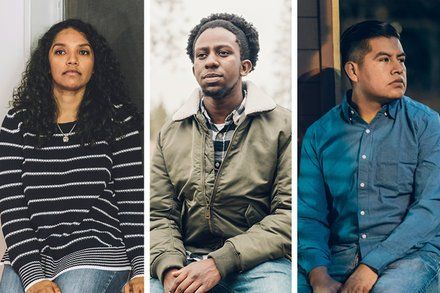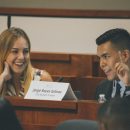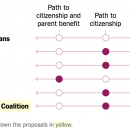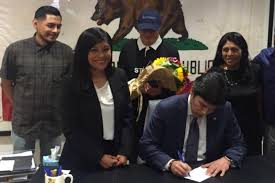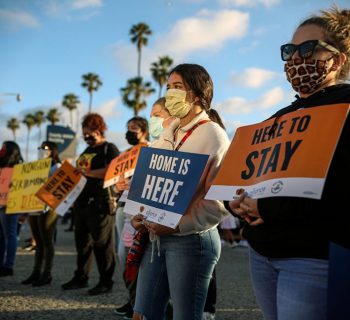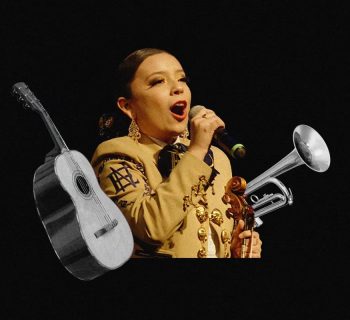By Caitlin Dickerson ~ NY Times ~ February 10, 2018
Getting lured into a kidnapper’s trap. Bidding goodbye to friends forever. Before they were unauthorized immigrants, they were children on cross-border journeys.
Stuffing a Transformer sweater into a suitcase. Getting lost in the desert. Saying goodbye to a first crush.
The roughly 700,000 unauthorized young immigrants who have come to be known as “Dreamers” took many paths to the United States, but they share one thing: a journey during childhood that defined the rest of their lives.
The group lived in the shadows until the Obama administration offered them temporary permission to stay under a program known as Deferred Action for Childhood Arrivals. President Trump eliminated DACA in September, and has called on Congress to create a permanent solution to their predicament in exchange for tough measures to curb immigration.
As the Senate prepares to negotiate the fate of the Dreamers this week, a group of them recalled the pivotal experience that took place before they could understand its significance.
A Kidnapping, Then Luck

Image Credit: Jared Soares for The New York Times
Leobardo Carmona Gijón, 23
Seattle
Native country: Mexico
Age when entered the United States: 10
Leobardo and his family (his parents, three of his siblings and a cousin) flew from Oaxaca in southern Mexico to Tijuana, just across the border with California. They planned to meet an uncle who was going to help smuggle them into the United States.
Instead, at the airport, the family was lured into a trap by a kidnapper. The man forced the family to pay him to act as their coyote, or guide, across the border.
When we were at the airport, my dad, being naïve I suppose, opened his notebook of phone numbers, and he was going to use the public phone to call my uncle and have him pick us up. But they are really smart about that and so they were able to read my uncle’s name on my dad’s notebook.
A stranger came to us and said that he was coming to pick us up on behalf of my uncle, but it turned out that it wasn’t true. He took us to a really poor and kind of dangerous neighborhood and he said, “That’s how our business works.” It’s cross with them or not at all.
They took us on a bus to the mountains — it was just a normal bus — and then we got off and started walking with a big team of about 30 to 35 people.
The Border Patrol was tracing them. We saw lights. And it just happened so quickly that everybody hid under the bushes, and everybody kind of spread out. I hid under a bush with one of my sisters, my brother and my cousin. And then, all we could hear was people being arrested and being detained.
When we came out, nobody was there. My parents were gone.
I cannot recall how we made a decision of where to go. I mean, my brother was 16 and my cousin was like 17, so they were kind of leading us. Then we suddenly saw a really, really small light, very, very far away. This was in the middle of desert mountains. We walked for a couple hours to get to that and it turns out it was a gas station. About five minutes after us being there and just kind of contemplating what we were going to do next, suddenly my mom and dad appeared at the same gas station.
Leobardo’s 12-year-old sister was still unaccounted for when the Border Patrol arrived at the gas station and arrested the rest of the family.
My mom was very very emotional all night, crying and just wondering where my sister was. Around 5 or 6 a.m. they took us back to Tijuana on a bus.
In Tijuana, Leobardo’s father contacted an older daughter who had already been living in Los Angeles, and she had good news: The 12-year-old had made it across the border with others who had broken off from the original group.
Three days later, the family set out on foot to cross again. This time they were successful.
Cake in Class, Then Goodbyes

Image Credit: Jared Soares for The New York Times
Kamau Chege, 22
Spokane, Wash.
Native country: Kenya
Age when entered the United States: 6
Kamau, his mother and 1-year-old sister entered the United States legally, with visas to join his father, who was studying at an American university. His father was unable to renew his visa before it expired, after which the family stayed in the country illegally.
We lived a little bit outside of Nairobi. I walked to school at 6 years old, so we’d see an airplane fly over, and my mom would say, “Dad took one of those and he went somewhere else and we are also going to get on a plane and go to be with him.”
I remember really weird things: having to go to different offices and take pictures for passports, go to the embassy, which is in the city. I don’t think we had a phone in our house, so we would go to one of my aunt’s houses to use one of those pay phones, the kind that you have to wind up.
I remember packing a sweater that was way too big for me, but if I remember correctly, my grandmother had made it. I think it had a Transformer character on the front, and I remember she had told me in Swahili that I would grow into it. It took up a lot of space because it was a thick wool sweater. So I had to sacrifice a lot of things to make sure that it fit in my suitcase.
His class threw a goodbye party. The teacher had saved some time at the end of the day. There was a cake brought out. My friends sang and we celebrated and cut the cake. And afterward, my uncle pulled up with my mom and my sister and waved goodbye and we left.
I think we had two transfer flights, maybe. I don’t remember exactly, but only one of them had a movie in it. And the other was just very long because you just sat there and didn’t have a lot to do. I just remember feeling like it was so long.
I remember kind of just waiting for the people to come around with the snacks. That was the most excitement there was on the ride.
We stopped in London, and then we landed in really muggy South Carolina. It was a really hot day in October.
When we landed at South Carolina and our cousins came to pick us up at the airport, it was huge relief. My mom wasn’t hovering over me as much as when we were traveling.
I believe my cousin had one of those old camcorders and was recording the event. There was lots of hugging, flowers and balloons. And my aunt and uncle also had this red kind of van or minivan. So we all packed in there, all the stuff, and we drive to their place, where my parents stayed for a few months before getting their first place to live.
Comfort Under the Stars
Image Credit: Jared Soares for The New York Times
Kevin Suarez, 18
Annandale, Va.
Native country: Bolivia
Age when entered the United States: 4
Kevin and his mother flew to Costa Rica, then traveled by bus to Nicaragua. From there, they took a series of rides in tractor-trailers and then walked into the United States and met his father, who was living in Florida.
I didn’t know about the concept of vacation, but I guess that’s what I thought it was. I never knew I was not going to go back to Bolivia and so I was confused, I was scared, but I was with my mom so that gave me some comfort.
I’m not sure if little kids are supposed to feel this, but I was actually scared for my mom because we were surrounded by a lot of men. I guess I saw her as defenseless if something were to happen.
They reached El Salvador. It wasn’t my culture. I thought the people looked meaner. I was scared.
I remember this particular building; it was broken down. I think the top level was broken down and it was pretty much exposed but it wasn’t raining that day, so we slept there one night. Maybe 80 percent of the roof was gone, along with part of the wall.
It was sort of unique because I’ve never experienced sleeping like that, because I was looking at the sky. I was calm for the first time in a while, and that’s why I just looked up at the stars. I guess I didn’t actually want to leave that place.
I just wanted to be somewhere stable and that felt stable. It just gave me a moment to breathe and just calm down.
They crossed into Texas.
All I can see is desertlike territory. There were fences with barbed wire. We might have been escaping from police because I remember that night we were more in a rush. We were all running. Not in a line but all sort of for ourselves. I don’t remember seeing my mom. I think I was just being passed around.
As soon as I step into the United States, my memory is like I went to sleep. I can’t really remember it.
I can say that it was initially really hard when I was introduced to my father. I’m not sure if my mom might have told me much about him, so I didn’t even know I had a dad.
I failed kindergarten and I had to do it again because I didn’t know English. One time I even cried because I wanted to understand it but I couldn’t.
‘Like a Roller Coaster’

Image Credit: Jared Soares for The New York Times
Sadhana Singh, 31
Washington, D.C.
Native country: Guyana
Age when entered the United States: 13
Sadhana flew to New York with her parents on tourist visas, which they planned to overstay. From there, they took a bus to Georgia to meet an uncle who lived there.
I was already familiar with America; I was familiar with New York at least. I had been coming for summers and Christmases.
I was starting to talk to boys and get attention from boys, and that kind of stuff in school, and then being like, “I’m moving to America, bye.”
I remember the feeling of going through like a roller coaster. At first I was sad, and then I was excited, and then I was sad again that I was going to miss my friends and my life.
From Guyana, the culture is sort of like, when you can go to America, or when you can visit America, you’re like a big shot, you know what I mean? To my friends, they’d be like, “Oh wow!” Everyone basically aspired to be able to go to America one day, to visit or to move there.
It was a flight overnight, I think, so it was nighttime when we left our house for the last time.
I remember being really sad and crying, then saying goodbye to my uncle.
We were all dressed in really nice clothes on our way to the airport because in Guyana, at the time, you dressed up to travel. I was wearing this colorful striped shirt with overalls.
I remember waiting in the lounge with my mom and my brother. I think my brother and I were just like playing and talking. He was 10.
This bus ride to Georgia felt so long, it felt endless. We were just driving through trees and trees and trees. You didn’t see any buildings or city, you just saw highway and trees.
I cried on the bus because I was like: “What is this place? It just brought me down.”
When we came to America and settled, that was when I really helped my parents. I really took to American English really well. I set up the bank accounts for my parents and I would manage their checkbook. I would tell my dad, this is how much money we have to spend.
Source: Caitlin Dickerson ~ NY Times ~ February 10, 2018

